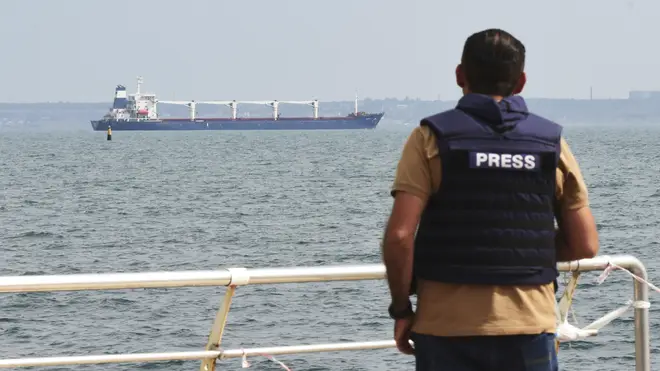
Richard Spurr 1am - 4am
2 August 2022, 14:54

The Sierra Leone-flagged Razoni is now expected to arrive in Istanbul on Wednesday.
The first cargo ship to leave Ukraine since Russia invaded its neighbour more than five months ago has run into bad weather in the Black Sea and is set to arrive later than scheduled in Istanbul, a Turkish official has said.
The Sierra Leone-flagged Razoni, which set sail from the Ukrainian port of Odesa on Monday, is now expected to reach Istanbul early on Wednesday, according to Rear Admiral Ozcan Altunbulak, a coordinator at the joint centre established to oversee the grain shipments.
Russian, Ukrainian, Turkish and UN officials are to inspect the ship after it anchors in Istanbul.

The inspections are part of a UN and Turkish-brokered deal to shift Ukrainian grain stockpiles to foreign markets and alleviate a mounting global food crisis.
Rear Admiral Altunbulak said “preparations and planning” are continuing for other ships expected to leave Ukraine’s ports, but he did not provide details.
As part of the July 22 agreement on shipments, which include Russian grain and fertiliser, safe corridors through the mined waters outside Ukraine’s ports were established.
The situation in the Black Sea remains tense, however, and Ukrainian President Volodymyr Zelenskyy urged international partners to keep a close eye on Moscow’s compliance with the deal.

More ships are expected to leave from Ukraine’s ports through the safe corridors. At Odesa, 16 more vessels, all blocked since Russia’s invasion on February 24, were waiting their turn, with others to follow, Ukrainian authorities say.
The more than 26,000 tonnes of corn on board the Razoni, destined for Lebanon, will make barely a dent in what the World Bank last week called “rising food insecurity” across the world.
“Record high food prices have triggered a global crisis that will drive millions more into extreme poverty,” its latest food security update said, blaming the war in Ukraine, global supply chain problems and the Covid-19 pandemic.
But the restart of shipments from Ukraine and Russia, which are major world suppliers of wheat, barley, corn and sunflower oil, raised hopes that the situation could improve. The fertile Black Sea region has long been known as the breadbasket of Europe.
The shipping developments came against a backdrop of continued fighting, especially in southern and eastern Ukraine.
I met with @UN Secretary-General @AntonioGuterres today in New York to reiterate the importance of working together at the United Nations to prevent Russia’s war against Ukraine from further worsening global food insecurity. pic.twitter.com/Mj51p0W8YV
— Secretary Antony Blinken (@SecBlinken) August 1, 2022
Moscow’s forces stuck to their familiar pattern of bombarding areas they do not hold, with Ukrainian officials reporting that Russian shelling killed at least three civilians in eastern areas overnight.
In the Donetsk region at the forefront of the Russian offensive, the bombardments targeted towns and villages, especially Bakhmut which has taken the brunt of recent shelling.
Donetsk governor Pavlo Kyrylenlo said that “the Russians are levelling Bakhmut with a massive barrage from the ground and from the air”.
“The shelling of Bakhmut is continuing around the clock, leaving civilians little chance to survive,” Mr Kyrylenko said in televised remarks.
The United States said it was sending an additional 550 million dollars’ worth (£449 million) of military aid to Kyiv.
US defence secretary Lloyd Austin said in a tweet late on Monday that the package included 75,000 rounds of artillery ammunition and more ammunition for the American-built Himars multiple rocket launchers, which have given Ukrainian forces an advantage on the battlefield.

Meanwhile, Russia’s Supreme Court declared Ukraine’s Azov Regiment a terrorist organisation, a designation that could lead to terror charges against some of the captured fighters who made their last stand inside Mariupol’s shattered steel plant.
Scores of Azov fighters are being held by Moscow since their surrender in mid-May. Russian authorities have opened criminal cases against them, accusing them of killing civilians.
The addition of terrorism charges could mean even longer prison sentences.
In a statement, the Azov Regiment dismissed the high court ruling, accusing Russia of “looking for new excuses and explanations for its war crimes”.
It urged the US and other countries to declare Russia a terrorist state.
Moscow has repeatedly portrayed the Azov Regiment as a Nazi group and accused it of atrocities, though no evidence to back up those claims has been made public. In May, Russia’s prosecutor general’s office filed a motion to designate the regiment a terrorist organisation.

The regiment, a unit within Ukraine’s National Guard, has a chequered history. It grew out of a group called the Azov Battalion, formed in 2014 as one of many volunteer brigades assembled to fight Russia-backed separatists in eastern Ukraine.
The Azov Battalion drew its initial fighters from far-right circles and elicited criticism for some of its tactics. Its current members have rejected accusations of extremism.
The regiment’s far-right origins have been seized on by the Kremlin as part of its effort to cast Russia’s invasion as a battle against Nazi influence in Ukraine.
Russian state media has repeatedly shown what it claimed to be Nazi insignias, literature and tattoos associated with the regiment.
Last week, dozens of Ukrainian POWs, including defenders of the Mariupol plant, were killed in an explosion at a barracks at a penal colony in Olenivka, an eastern town controlled by pro-Russian separatists.
Moscow and Kyiv have blamed each other for the blast, with Kyiv saying Russia blew up the barracks to cover up torture against the POWs.